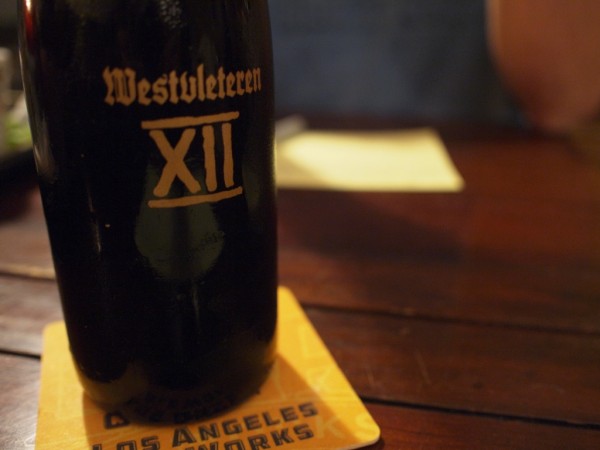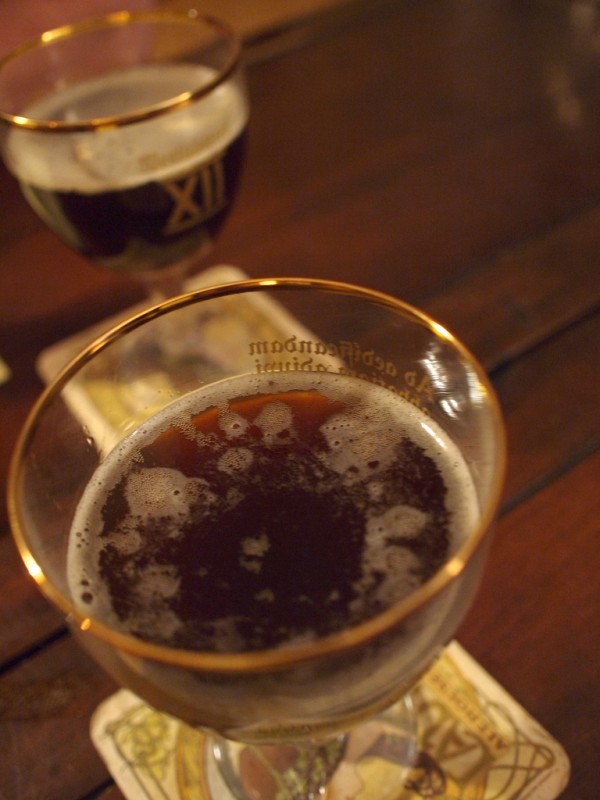Chasing the Unicorn: Westvleteren XII

In endeavoring to review the Westvleteren XII, I can’t help but be reminded of the challenge faced by Chuck Klosterman in his review of Guns N Roses’ Chinese Democracy (to date, my all-time favorite review of anything). Finally experiencing a new record from his favorite band that was 15 years and more than $13 million in the making, Klosterman didn’t quite know where to begin.
Reviewing Chinese Democracy is not like reviewing music. It’s more like reviewing a unicorn. Should I primarily be blown away that it exists at all? Am I supposed to compare it to conventional horses? To a rhinoceros? Does its pre-existing mythology impact its actual value, or must it be examined inside a cultural vacuum, as if this creature is no more (or less) special than the remainder of the animal kingdom?
In some ways, the Westvleteren XII is the Chinese Democracy of beers. One cannot extricate the beer from the myth that surrounds it, fortified by its almost comical elusiveness. The abbey of Saint Sixtus of Westvleteren’s website describes the ordeal one must endure to score this legendary Belgian quadrupel. First, you must call the abbey, nestled in the Flemish countryside, at a prescribed time. You will probably get a busy signal for a very long time. They even admit that “it’s a matter of having a lot of patience as well as a lot of luck.” Not a surprising viewpoint, coming from a bunch of Trappist monks. One cannot simply walk into a beer store, or even into the abbey itself, and grab a bottle of Westvleteren. These beers are only available in person, by appointment, at the abbey in Belgium, if you’re lucky.
That is, until 2012. The monks, needing a new roof for their crumbling abbey, decided to make the Westvleteren XII available in 6 pack “bricks” in the United States as a fundraiser. The Westie had never been distributed to the United States, and according to the monks, it will never be available here again.
In Los Angeles, only K&L Wines managed to order fewer than 100 bricks for sale. The LA store reported fielding some 3,200 calls the day the Westvleteren was released. They instructed the circling beer fiends to attempt to place an order online, and they would only be notified of their successful order if the credit card payment went through. My intrepid husband tried his luck, completely convinced that there was no way in Hell we were getting our hands on this beer. The harried store clerks were equally skeptical.
Somehow, despite all odds, we managed to order a brick. Talk about a benediction.
As an object, the haughty yet strangely wee Westvleteren bottle projects its own otherness; my husband reported feeling genuinely nervous in its presence. Similarly Chinese Democracy, Klosterman points out, was perhaps the last album that will matter as an album as a whole, instead of the songs that sum up its parts. In both cases, between the myth and the object there is so much to take in before one even experiences the art itself. How could something as deceptively simple as a beer, or an album, ever live up to that kind of hype?
 On January 1, 2013, my husband and I decided to experience the Westvleteren XII. Armed with yellow index cards and pens, we took our time with every part of the experience, noting its slow volcanic carbonation, and how its character emerged as it warmed. We were unknowingly undertaking a rather monkish lectio divinia, where monks “chew” on a piece of spiritual literature until they feel they’ve thoroughly wrung out all there is to extract. “The old monks call it ruminatio,” their monks explain, “i.e. what cows do with the grass.” We approached the Westvleteren with a similar slow reverence.
On January 1, 2013, my husband and I decided to experience the Westvleteren XII. Armed with yellow index cards and pens, we took our time with every part of the experience, noting its slow volcanic carbonation, and how its character emerged as it warmed. We were unknowingly undertaking a rather monkish lectio divinia, where monks “chew” on a piece of spiritual literature until they feel they’ve thoroughly wrung out all there is to extract. “The old monks call it ruminatio,” their monks explain, “i.e. what cows do with the grass.” We approached the Westvleteren with a similar slow reverence.
I was especially charmed by the shrunken Chimay-style glasses that came with the brick, emblazoned in gold with the Latin phrase, “Ad aedificandam abbatiam adiuvi,” which translates to, “I helped build the abbey.” Those little beauties will get plenty of use chez Rosenbloom, a proxy Holy Grail for beer geeks persisting long after the last Westie in our brick is gone.
All accoutrements aside, let’s finally address the ultimate question: how was the beer? At first, the insane carbonation overtook all aspects of the beer. Even after the first couple of sips, my mouth felt like I’d just been to the dentist, or perhaps I’d met the business end of some Scrubbing Bubbles(TM). Turns out, like the monks who brew the Westvleteren, the beer needed a little more breathing room than most. As the beer inched towards room temperature, lovely caramel and molasses notes crept up through its ruby haze, revealing a dark candied fruit beer far easier to drink than its 10.2% ABV would suggest. Because some of my precious half of the 11.2 oz. bottle was wasted on the carbonation bomb, I look forward to the Trappist tasting we’re planning, where we’ll pit one of our remaining unicorn bottles against its horse and rhinoceros brethren. Was it the best beer I’d ever had? Not by a long shot. But like a medieval manuscript forged by pious hands in a monks’ scriptorium, its inherent beauty was buttressed by its glorious provenance.

Having come full circle with his Chinese Democracy experience, Chuck Klosterman admits that the despite all the hype and jokes, at the end of the day he loves what Axl Rose creates, including Chinese Democracy. I find myself in a similar place with the Westvleteren. Once all the hype is out of the window and the bubbles settle down, I agree with Chuck that the artists “did a good thing here.”
Megan Rosenbloom is a resident of Los Angeles and a new contributor to Girls Who Like Beer

Leave a Reply
Want to join the discussion?Feel free to contribute!